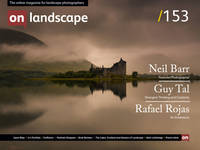Reflections of my own experiences

Priamo Melo
Príamo Melo is a chemical engineer, landscape photographer and an educator in both fields in Rio de Janeiro, Brazil. He frequently writes articles on photography for Brazilian magazines, is an active member of the Brazilian Nature Photographers Association (AFNATURA) and leads landscape photography expeditions both in Brazil and abroad.
Since the Romantism, when landscape painting gained full strength and emancipated itself as a distinct genre in the fine arts, the representation of the landscape has evolved steadily and became a central subject matter of photography since its very birth. Now, immersed in the revolution dictated by the digital era, landscape photography has never found so many practitioners. In the so called social networks, such as Instagram, for instance, one may find him or herself completely absorbed by an abundance of landscape photographs, some strong enough not only to illustrate us the very beauty of the planet we live in but also to stimulate us to reflect upon its need for care and conservation.
Some of the fine landscape photographs we find out there are not merely the result of a good combination of mastered technique and standing in proper place and time at a location. Their achievement may also be strongly to do with the restlessness of the photographer in his or her quest to answer inner questions about the meaning of the landscape for him or herself, and also to assess the significance, relevance or even possibility to extract its quintessential attributes from a medium - photography - that overly simplifies the true human experience before nature.
Recently, I watched an interview with master photographer Joe Cornish as he spoke about the need of self-reliance that sometimes landscape photographers must resort to when in search for such answers. He mentioned one trip to Scotland, when he became completely alone "in bleak Winter conditions, never seeing a soul". He advances by stating that "you learn a self-reliance that's quite significant in the way that it defines you as a person". Reflecting upon the sort of blessing that it is living in a country where health and safety culture is guaranteed, using his own words, and the fundamental need for people to stay safe and have respect for human life, he concludes that "in the creative life, we have to take risks", clear to me that he talks about risks taken under certain controlled parameters.

